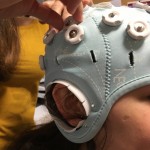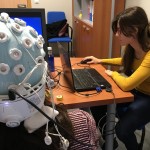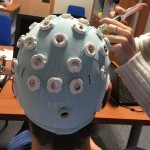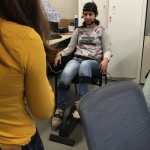Decoding and stimulation of motor and sensory brain activity to support long term potentiation through Hebbian and paired associative stimulation during rehabilitation of gait · Associate · DPI2014-58431-C4-2-R
Cerebral vascular accident (CVA, Stroke) and Spinal cord injury (SCI) are two of the major motor disorders due to damage in the human nervous system leading to physical impairment in Western society. These conditions will in general disrupt sensory and motor pathways that in turn lead to permanent pathological gait, resulting in impaired independent ambulation.
Walking incorrectly creates a stigma and makes patients more susceptible to injury, affecting quality of life. Most advanced robotic treatments to rehabilitate walking function in neurological patients could specifically target the neuronal changes that may contribute to skill acquisition and recovery. Afferent-generated feedback can be applied in these interventions in association to motor planning at brain level.
The first objective of the project is to validate the effectiveness of a novel intervention to promote motor control re-learning in neurological patients by means of an associated use of motor planning at brain level, sensory stimulation at cortical level and afferent feedback provided with a wearable lower extremity exoskeleton.
On the other hand, lower extremity exoskeletons as assistive technologies have been mostly applied in chronic SCI patients as temporary alternative to wheelchairs. Such systems are still not ready for real everyday use in community settings and to maintain neuromusculoskeletal health below the level of the injury. This situation is due basically to the limited flexibility of mechanical and control structures to manage the interactions with musculoskeletal system and human gait dynamics, respectively.
The second objective of the project is to validate the effectiveness of a novel lower extremity wearable exoskeleton with embodied intelligence and enhanced self-learning characteristics in the assistance to locomotion in complete and incomplete SCI in terms of reduced learning periods, improved adaptation and more versatile and dextrous operation.
JCR Journals
- Rodríguez-Ugarte, M., Iáñez, E., Ortíz, M., & Azorín, J. M. Personalized Offline and Pseudo-Online BCI Models to Detect Pedaling Intent. Frontiers in Neuroinformatics, 11: 45, 11 Julio 2017, DOI: 10.3389/fninf.2017.00045, IF: 3.870 (Q1)
- I. N. Angulo-Sherman, M. Rodríguez-Ugarte, N. Sciacca, E. Iáñez, J. M. Azorín, “Effect of tDCS stimulation of motor cortex and cerebellum on EEG classification of motor imagery and sensorimotor band power” Journal of NeuroEngineering and Rehabilitation, 14:31, 19 April 2017 DOI: 10.1186/s12984-017-0242-1. IF: 3.516 (Q1)
- Á. Costa, R. Salazar-Varas, A. Úbeda and J.M. Azorín, Characterization of Artifacts produced by gel displacement on non-invasive Brain-Machine Interfaces during ambulation, Frontiers in Neuroscience, Vol. 10:60, pp. 1-14, 2016, DOI: 10.3389/fnins.2016.00060. Índice de impacto (JCR 2015): 3.398 (Q2)
- E. Hortal, A. Ubeda, E. Iañez, J.M. Azorin, and E. Fernandez, EEG-based Detection of Starting and Stopping During Gait Cycle, International Journal of Neural Systems, Vol. 26 (7), 1650029, pp. 1-13, 2016, DOI: 10.1142/S0129065716500295. Índice de impacto (JCR 2015): 6.085 (Q1)
- M. Rodríguez-Ugarte, E. Iáñez, M. Ortiz and J.M. Azorín, Personalized offline and pseudo-online BCI models to detect pedaling intent, Frontiers in Neuroinformatics (en evaluación por la revista). Índice de impacto (JCR 2016): 3.870 (Q1)
- M. Rodríguez-Ugarte, M. Ortíz-García, F.R. Llorella, E. Iáñez, J.M. Azorín, Detección de la intención de pedaleo mediante una interfaz cerebro-computador no invasiva, Revista Iberoamericana de Automática e Informática Industrial (en evaluación por la revista). Índice de impacto (JCR 2015): 0.475 (Q4)
- A. Úbeda, J.M. Azorin, D. Farina, M. Sartori, Linking cortical and neuromuscular function in incomplete spinal cord injury individuals for a new class of brain-machine interface, Frontiers in Computational Neuroscience (en evaluación por la revista). Índice de impacto (JCR 2015): 2.653 (Q1)
Other Journals
- M. Rodríguez-Ugarte, E. Iáñez, Á. Costa, J.M. Cano, J.A. Flores, J.M. Azorín, Análisis offline de la detección del inicio del pedaleo utilizando distintas configuraciones de electrodos mediante señales de EEG, Cognitive Area Networks, Vol. 3(1), Actas 8º Simposio CEA de Bioingeniería 2016 (23 y 24 de junio de 2016, Madrid), pp. 63 – 68, Junio 2016.
Conferences
- E. Hortal, M. Rodríguez, J. Ibáñez, J.L. Pons, J.M. Azorín, Diseño preliminar de una plataforma experimental basada en neuroestimulación para el análisis de la interacción corticomuscular para rehabilitación de miembro inferior, Libro de Actas del XXXIII Congreso Anual de la Sociedad Española de Ingeniería Biomédica (CASEIB 2015). Madrid, 4, 5 y 6 noviembre 2015. ISBN: 978-84-608-3354-3, pp. 451-454, 2015. [Colaboración entre subproyectos]
- F.R. Llorella, G. Patow, J.M. Azorín, Spectral Entropy and Vector Machines Support for Imagined Motion Detection in Brain-Computer Interfaces, Converging Clinical and Engineering Research on Neurorehabilitation II. Proceedings of the 3rd International Conference on NeuroRehabilitation (ICNR2016), October 18–21, 2016, Segovia, Spain. ISBN 978-3-319-46668-2, pp. 1121-1125, 2016.
- M. Rodríguez-Ugarte, A. Costa, E. Iáñez and J. M. Azorín, Analyzing electrode configurations to detect intention of pedaling initiation through EEG signals, 2016 IEEE International Conference on Systems, Man, and Cybernetics (October 9-12, 2016, Budapest, Hungary). Conference Proceedings. ISBN: 978-1-5090-1819-2, pp. 1614-1619, 2016.
- M. Rodríguez-Ugarte, Á. Costa, E. Iáñez, A. Úbeda and J.M. Azorín, Pseudo-Online Detection of Intention of Pedaling Start Cycle Through EEG Signals, Converging Clinical and Engineering Research on Neurorehabilitation II. Proceedings of the 3rd International Conference on NeuroRehabilitation (ICNR2016), October 18–21, 2016, Segovia, Spain. ISBN 978-3-319-46668-2, pp. 1103-1107, 2016.
- M. Rodríguez-Ugarte, E. Hortal, Á. Costa, E. Iáñez, A. Úbeda, J.M. Azorín, Detection of intention of pedaling start cycle through EEG signals, Proceedings of the 38th Annual International Conference of the IEEE Engineering in Medicine and Biology Society (August 16-20, 2016, Orlando, FL). ISBN: 978-1-4577-0220-4, pp. 1496-1499, 2016.
- M. Rodriguez-Ugarte, N. Sciacca, J.M. Azorín, Transcranial Direct Current Stimulation (tDCS) and transcranial Current Alternating Stimulation (tACS) review, Actas de las XXXVII Jornadas de Automática (7, 8 y 9 de septiembre de 2016, Madrid). ISBN: 978-84-617-4298-1, pp. 137 -143, 2016.
- I. N. Angulo Sherman, M. Rodríguez Ugarte, E. Iáñez Martínez, J. M. Azorín Poveda, Efecto en la clasificación de imaginación motora a partir del EEG al aplicar tDCS en la corteza motora y el cerebelo, Libro de Actas CASEIB 2016. XXXIV Congreso Anual de la Sociedad Española de Ingeniería Biomédica. Valencia, 23 al 25 de noviembre de 2016. ISBN: 978-84-9048-531-6, pp. 249-252, 2016.




